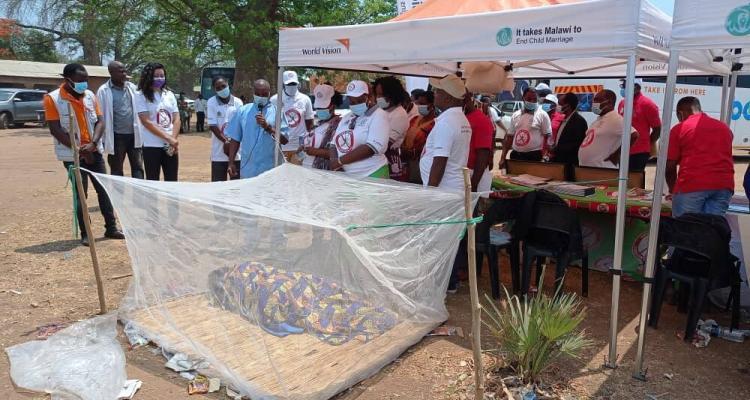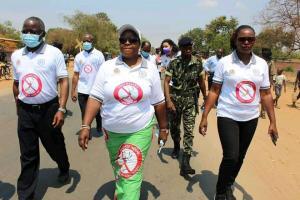
Minister of Health Khumbize Kandodo Chiponda yesterday launched mass distribution of mosquito nets in which the ministry seeks to distribute nine million nets across the country.
The Minister launched the program in Salima district and she was accompanied by SADC delegates including Ministers and SADC Executive Secretary.
The launch of the distribution was combined with commemoration of SADC day of Malaria and the event was being commemorated under the theme ” Together we can defeat malaria”.
The day is observed in November each year during SADC Health Ministers Summit, and this year the summit was being held in Lilongwe at BICC from 8 to 10 November, 2021.
Speaking after the event, Minister of Health Khumbize Chiponda said as a Ministry they have put in place some interventions that will help to curb Malaria by 2030 and one them is distribution of mosquito nets.
“Malaria is a public health threat and during this summit we discussed so many issues and one of the issues we discussed was trying to find ways and means of making sure that at least by 2030 Malaria should no longer be a public health threat. We are doing this because from the research it is showing that Africa alone spends about 12 Billion US dollars on Malaria a year and in SADC region almost over 400 deaths are due to Malaria.
“That is why as member states we are coming together to make sure that we fight this Malaria and try to eliminate any death from Malaria. So, one of the interventions is distribution of the mosquito nets as vector control. As a country we are going to distribute 9 Million mosquito nets. Our target is at least 2 Malawians should share a net,” she said.
She added that the ministry is going to distribute mosquito nets and also some of the interventions are spraying of insects pesticides in some houses especially in the high burden areas like Nkhatabay, Balaka and Mangochi. We are also doing vector control by spraying insects pesticides and of course each and every year pregnant women they are given anti-Malaria to make sure that they don’t get sick during the period. So, these are some of the interventions that we are doing and today we had some SADC delegates who came to witness the same because we are celebrating it as a SADC day of Malaria,” said Chiponda.

Chiponda also noted that there are challenges on some of the interventions like the distribution of mosquito nets as many still use nets for some other purposes that are not related to prevention of Malaria, but the Ministry is trying to educate people on the importance of using the mosquito nets.
“We have had so many challenges but one of the challenges is that when you distribute the nets you find that especially from lake side these nets are used for fishing. Other people use them in their gardens. So, these are the things which we have to keep teaching our people, the public awareness, sensitisation on the goodness of using the mosquito nets properly. So, as government we will continue doing that, and in the other areas the numbers have really come down. we have really made some gains in terms of case management but also prevention of Malaria so it’s not like we have not achieved everything no, as a country we have achieved but we still want to do more and we are targeting the year 2030,” said Chiponda.
In his remarks, SADC Executive Secretary His Excellency Elias Mpedi Magosi said SADC need to approve strategy that will help in curbing Malaria.
He said the fight against Malaria requires regional effort and regional resources so that Malaria is actually eliminated through the region.
“We also make sure that policies, strategies and regulations are aligned to the regional approach so that all of them are acting on that similar tendency and also resources are put to use, and that’s why we have also partnered with all international partners to make sure that we provide those resources. The regional strategy is critical but there are resources behind that and as secretariat we will continue providing further strategies, further tools for the member states to be able to achieve this,” said Magosi.
Chief of Party for Global Fund Grants, TB, Malaria and HIV for World Vision Bizwick Mwale said the intervention they are doing such as spraying insects pesticides in houses is very important because its complementing government efforts to the prevention of Malaria in Malawi.
“We are spraying the chemicals in 3 districts of Balaka, Mangochi and Nkhatabay and we have seen a decrease in terms of the number of Malaria cases in these 3 districts. You may recall that we were demonstrating the impact that we have seen in Mangochi where we have come down from almost 304 cases per 1000 population to almost 183 cases which is a big drop from the national target so I think the impact is very good and the results are nice and I hope government can look at this and see the possibility of scaling up country wide,” said Mwale.
The distribution of mosquito nets exercise is being funded by Global fund, Gavi and also Unicef. Malaria remains a huge public health problem in the SADC region with 75 percent of the population at risk.














